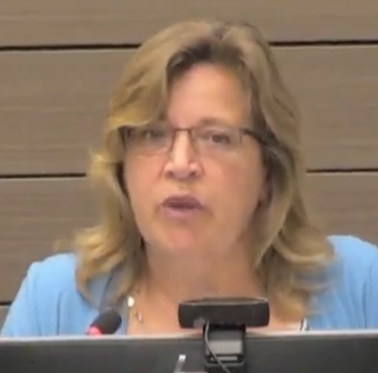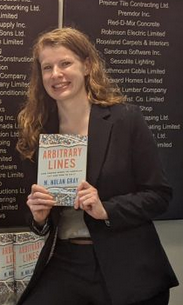 By Pepper Parr
By Pepper Parr
November 1st, 2023
BURLINGTON, ON
It was during a discussion about a new approach to issuing development permits that Ward 4 Councillor Shawna Stolte said to Michelle Diplock, Manager of Planning and Government Relations for the West End Home Builders’ Association: “I think you’re the right person for me to ask this question.

Ward 4 Councillor Shawna Stolte
“Given the fact you represent the building industry, so you’re not speaking for any developer in particular, but I tasked you to consider going back to have a conversation with the members of your association (WEHBA ) – now this is going to be a little bit inflammatory but I’m going to say anyway, – when you use the terms economic viability, or that this new bylaw may impact the ability for developers to provide housing and the way the city wants. I think each of those terms needs to be followed with the extension of that sentence by saying economic viability based on the development industry’s present business model, or impact the ability to provide housing based on the development industry’s present business model.”
“My question is, do you think there is an appetite within the development community to work with the city within this bylaw, to collaborate so that if the development industry is looking to accommodate their business model, that they’d also be willing to look to amend their business model to make sure that Burlington is getting the housing it needs?”

Michelle Diplock is a Registered Professional Planner and the Manager of Planning and Government Relations for the West End Home Builders’ Association.
Diplock responded: “I think there’s two parts to your question. I think in terms of the baseline in terms of what a developer needs to build, and the profit margins that they are required to demonstrate to the banks and the financial institutions to proceed is a 15% requirement. So if a developer can’t prove they’re going to meet that 15% profit margin, they are not able to proceed with that development.
“And so they will consider kind of doing a different type of development or doing something somewhere else where they can meet that because if they cannot get the financing from the banks, and I think this is an increasingly important piece, as interest rates are going up, and as banks are kind of calling and saying like, how are you leveraged on what does your entire kind of company’s portfolio look like? That’s a really important piece.
“And so just acknowledging the fact that like, if the, if you’re going for private sector, new development, you need to be able to meet that 15% threshold on your pro forma or the numbers, like don’t work and nothing gets built. I think there is an appetite on behalf of the industry to work with the city to see how we might do kind of the piece of our business that is really to deliver market housing supply in a way that also supports a number of the city’s other objectives, as well.
“But I think right now, and in today’s current context, one of the primary objectives needs to be new housing supply to address our current kind of backlog of shortage and take the pressure off of the entire kind of housing continuum spectrum.”
Stolte replies – “Good, thank you. I appreciate that. I don’t know the building industry well enough to understand is there.
“Is it present practice or do you think there could be some room for a property owner were to own two properties, one of which was geographically located to accommodate luxury units therefore the potential for profit margin could be much higher than 15% and approach that as a package where on another property they may own that may be more suited more suitable on say a public transit route for more affordable or attainable housing.
“Do you see there being the possibility of approaching banks with a package arrangement where one property subsidizes the other so that everybody in Burlington gets access to housing that they can afford?

Michelle Diplock promoting Arbitrary Lines, a book that highlights the alarming problems with municipal zoning. Ms Diplock did not write the book.
Diplock: “So I’m going go off script – we were hosting a meeting this morning with a variety of nonprofits and for profit builders to discuss these challenges in Hamilton. And I think one of the biggest kind of barriers for the nonprofit and delivering the affordable housing side is they don’t have the money to do the initial kind of pieces to push forward projects like that.
“So they can’t approach a bank and ask for a loan if they don’t have that kind of collateral within their portfolio which nonprofits typically do not. I think there have been some examples of builders collaborating with nonprofit organizations, but I think it’s very difficult to do across different properties. So that is one, I guess, answer, I think.”
Stolte. Thank you for that. Really helpful.


















